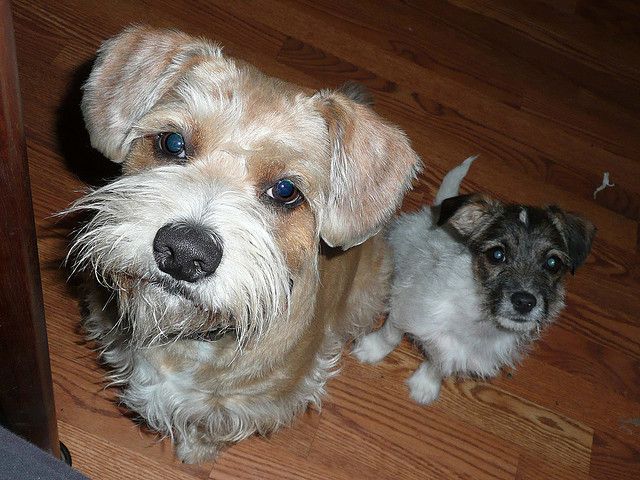Welcome to our weekly 'Ask a Vet from the SF SPCA' feature on 7x7.com. Dr.Jeannine Berger, DVM, DACVB is a board certified veterinary behaviorist who counsels guardians whose pets’ issues are beyond the scope of training. Think of her as a pet shrink…at your service. Ask your own questions in the comments!
Q:Why do dogs beg? We were invited to a friend’s house and their dogs sat next to me the entire meal, drooling. I did not feed them anything. Why did they beg and drool even if i did not give him anything?
A: Optimism! The payoff is worth the wait and there is typically one person in any crowd that gives in. Why the dogs picked you as the weak link–not sure. Like any good scavenger, most dogs are hardwired to seize any opportunity to get a bite of human food. Chances are, your friend's dogs have been fed a juicy morsel from the table in the past —or were simply lucky enough to catch one that fell from a plate or a hand— and now they have committed beggars on their hands. Fortunately, it’s a fixable problem.
First, make sure your dog is not hungry–feed him his meal, or even better, provide him with a food dispensing toy while you are eating your dinner. Ask your vet how much food you should be giving him per day.
Then, you have two options for approaches to change the behavior:
1. Use management techniques, i.e. prevention:
Restrict your dog’s access to the kitchen or dining room during mealtimes by using a baby gate. If your dog is crate trained, you can put him in his crate with a stuffed Kong, chewie, or food puzzle toy. Alternatively, if you want your dog to be in the room with you, use a short leash to tether him to a heavy piece of furniture. Give him a dog bed or comfy place to be so it's a good experience for him.
2. Use training solutions:
Dogs love food and company, and who can blame them? A dog drooling at your feet or pawing or whining at you, on the other hand, is less enjoyable. The best training option is to teach your dog what we call an incompatible behavior, i.e. something he is allowed to do which prevents him from doing something he’s not allowed to do. We recommend “Go to bed.” Basically, you establish a bed or mat as the “go to” place. When your dog goes there, he gets a high-value treat. You can start by standing near the bed, pointing and say “go to bed.” When he does, give the treat (but only once he is sitting fully on the bed). Eventually, he will associate the bed and the phrase “go to bed” with a reward.
Tips:
• Be consistent. If you don’t like begging, don’t feed your dog scraps when you eat—and don't let friends, family, or well-meaning strangers do so either. This is particularly important if you don’t want your dog to beg in public (at cafés or other people’s houses).
• Never punish or yell at your dog for begging. This kind of negative attention is more than enough reinforcement for your dog to keep begging.
• Prevention is far easier than curing a chronic beggar, so be sure to teach your puppy or newly adopted dog good manners from day one. Make it a rule to never feed your dog tasty bits at the table unless he is calmly laying at your feed or in his bed.
Related Articles
